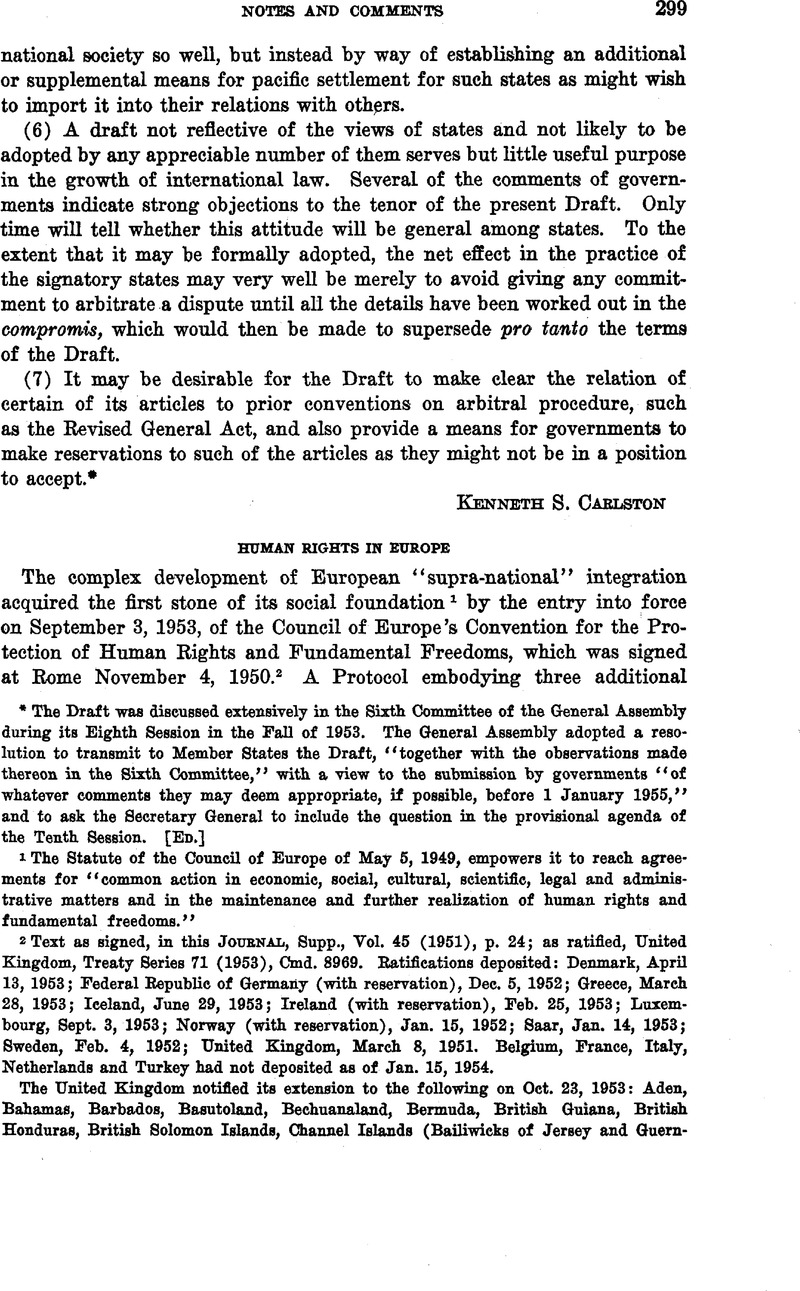Article contents
Abstract

- Type
- Notes and Comments
- Information
- Copyright
- Copyright © American Society of International Law 1954
References
1 The Statute of the Council of Europe of May 5, 1949, empowers it to reach agreements for “common action in economic, social, cultural, scientific, legal and administrative matters and in the maintenance and further realization of human rights and fundamental freedoms.”
2 Text as signed, in this Journal, Supp., Vol. 45 (1951), p. 24; as ratified, United Kingdom, Treaty Series 71 (1953), Cmd. 8969. Ratifications deposited: Denmark, April 13, 1953; Federal Republic of Germany (with reservation), Dec. 5, 1952; Greece, March 28, 1953; Iceland, June 29, 1953; Ireland (with reservation), Feb. 25, 1953; Luxembourg, Sept. 3, 1953; Norway (with reservation), Jan. 15, 1952; Saar, Jan. 14, 1953; Sweden, Feb. 4, 1952; United Kingdom, March 8, 1951. Belgium, France, Italy, Netherlands and Turkey had not deposited as of Jan. 15, 1954.
The United Kingdom notified its extension to the following on Oct. 23, 1953: Aden, Bahamas, Barbados, Basutoland, Bechuanaland, Bermuda, British Guiana, British Honduras, British Solomon Islands, Channel Islands (Bailiwicks of Jersey and Guernsey), Cyprus, Falkland Islands, Fiji, Gambia, Gilbert and Ellice Islands, Gold Coast, Jamaica, Kenya, Gibraltar, Leeward Islands, Federation of Malaya, Malta, Isle of Man, Mauritius, Nigeria, Northern Rhodesia, North Borneo, Nyasaland, St. Helena, Sarawak, Seychelles, Sierra Leone, Singapore, Somaliland, Swaziland, Tanganyika, Trinidad, Uganda, Windward Islands (Dominica, Grenada, St. Lucia, St. Vincent), Zanzibar; at its request, the Kingdom of Tonga (U. N. Doc. E/CN. 4/554/Add. 2).
Denmark acceded for Greenland.
3 Ad Hoc Assembly … Draft Treaty embodying the Statute of the European Community (Paris, Secretariat of the Constitutional Committee, 1953).
4 The convention repeats, rephrases or elaborates the provisions of the Universal Declaration in Arts. 2–5, 8–12, 16, 18–20, 29 (2) and 30; the protocol utilizes Arts. 17, 26 (1, 3) and 21 (3) of the Declaration.
5 U. N. Doc. E/CN. 4/554/Add. 1; United Kingdom, Misc. No. 7 (1952), Cmd. 8535. Ratifications of the protocol were deposited with those for the convention by Denmark, Greece (with reservation), Iceland, Ireland, Luxembourg (with reservation), and the Saar, and for Norway Dec. 18, 1952; Sweden (with reservation), June 22, 1953 and United Kingdom (with reservation), Nov. 3, 1952. (U. N. Doc. E/CN. 4/554/Add. 2.) Belgium, France, Federal Republic of Germany, Italy, Netherlands and Turkey have not ratified.
6 Luxembourg reserved the provisions of the law of April 26, 1951, regarding the liquidation of certain ex-enemy property, rights and interests, subject to sequestration.
7 For Greece the application of the word “philosophical” will “conform with the relevant provisions of internal legislation.”
The United Kingdom accepted the second sentence “only so far as it is compatible with the provision of efficient instruction and training, and the avoidance of unreasonable public expenditure.”
Sweden will not exempt children from studying certain subjects in state schools by reason of their parents invoking their own philosophical convictions, and will not grant children not belonging to the Swedish Church exemption from study of the Christian religion unless the school has “a properly organized system of religious instruction.”
8 See their description in notes 6 and 7 above.
- 25
- Cited by


